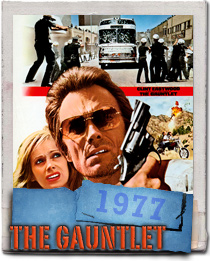Just last week l was reading this article. lt talked about flying. Said we’d all become just like cattle. Trusting our lives to people we don’t even know. Like pilots. Said we do it all the time. Then we get our heads bashed in. . . . . .like cattle, for being so trusting.
A couple months ago, I picked up a DVD of Clint Eastwood’s 1977 movie, “The Gauntlet,” which was shot mostly in Phoenix. I hadn’t seen it since it was on UPN one afternoon in the summer of 1996, just a few weeks after I moved here. I remember at the time being excited and feeling a sense of pride that Phoenix was my home, and that the film was set in what was now essentially my hometown. Indeed upon re-watching it, I noticed various downtown Phoenix landmarks are visible in the background. Hanny’s can actually be seen in a skyview during one driving sequence.
The Gauntlet is a pretty solid film up until the last couple of minutes, with it’s hyperdramatic, highly implausible ending (I find it hard to believe that hundreds of cops would just stand there silently, idly watching while the police commissioner and a supposed fugitive argue and shoot each other at point blank range.) The remark about air travel made by the waitress in Las Vegas reminded me of the nature of my own reservations about flying. It’s the fact that while it’s statistically safer, you have absolutely zero control over the outcome of the situation. It’s like buying a reverse lottery ticket with the jackpot consisting of a horrifying death. While you’re much more likely to die behind the wheel of a car, to some extent you can trust your own instincts and defensive driving skills, to give yourself at least some small amount of leverage to tip the balance. I’ve always felt a similar, slightly less ambivalence toward mass transit. Though you may be in a heavy traffic or construction environment when driving a car, you have control over the ambiance of your immediate environment (volume of the radio, level of peace and quiet, and whom or what is sitting next to you.) I’ve ridden the bus several thousand times in my life, and besides the fact that it doubles or triples the travel time to any destination, the worst part about it is always the plethora of irritating and ill-mannered people you have to share the ride with. I sit in silence, trying to avoid unsolicited talking as well as block out all of the loud and obnoxious banter from oblivious people who don’t seem to give a rat’s ass about the riding experience of anyone else. Once on a bus ride from Los Angeles, two ghetto teenage girls sat behind me discussing their multiple miscarriages the entire length of the trip. “I told my man he needs to start wearin’ cause I don’t wanna be gettin’ pregnant again.” One time on a West Hollywood city bus, the driver pulled over while a muscular Russian guy fought a drunken homeless black guy that had been harassing the other passengers.
People who always talk of the great train systems in Japan and Hong Kong, don’t seem to realize that when attempting to duplicate it here, we would not have the luxury of riding it with courteous and intelligent Asian people (not even taking into account the “groping” incidents women frequently endure in these countries’ rail cars.) I had a good experience the one or two times I used the Los Angeles subway to get to the San Fernando Valley (it was fast, and there was almost nobody on it) though one might question the wisdom of building an underground railway system in an area that is built on a famous faultline and therefore highly susceptible to potentially massive earthquakes. Personally I would rather that cities incorporate strategies to limit or reduce the overall amount of people, rather than working to attract and accommodate large increases in uneducated people, herding everyone into cattle cars and virtually eliminating individuals’ control over their own personal space and travel experience. In theory, I’m not really opposed to the idea of public transportation. I enjoyed the monorail at Disneyland as much as the next kid and would gladly set aside my idiosyncratic reservations and fears if I were able to ride something remotely 1960’s/70’s futuristic to work everyday. Riding the contemporary city bus or light rail feels more like Soylent Green than 2001 A Space Odyssey, though. The Phoenix of 1977 as depicted in The Gauntlet has been thoroughly transformed, yet like the film, it still retains much of it’s charm. As with most change, something’s gained and something’s lost.
Brandon Adamson is the author of “Beatnik Fascism“

